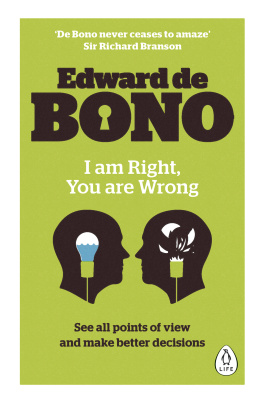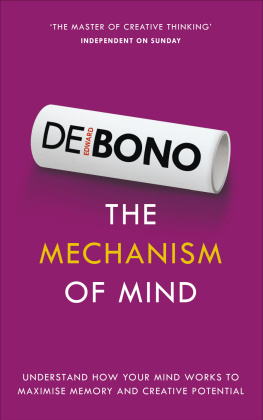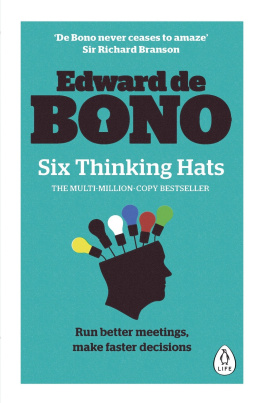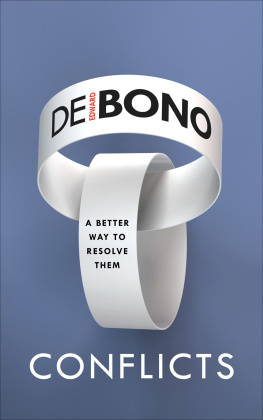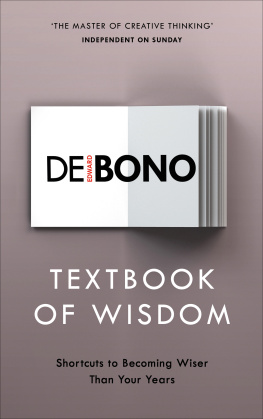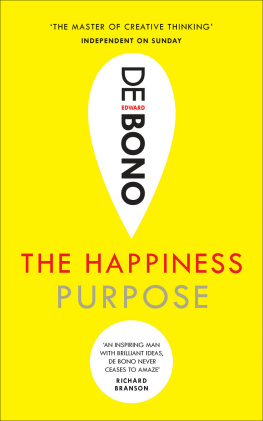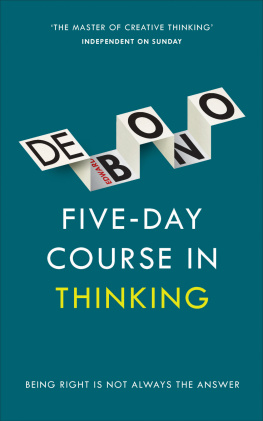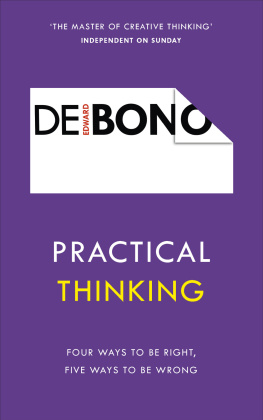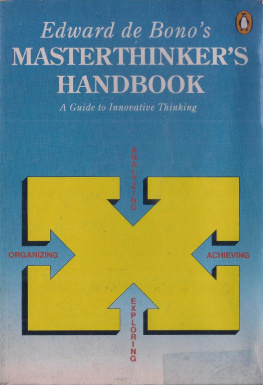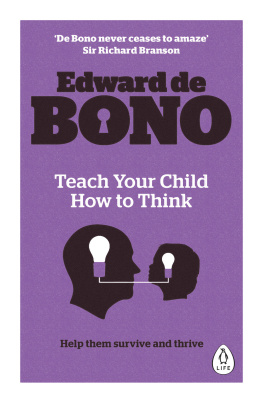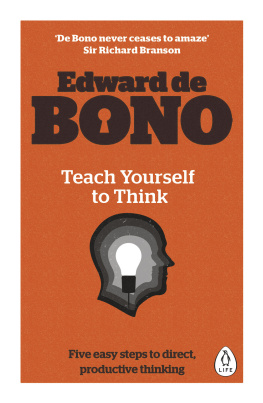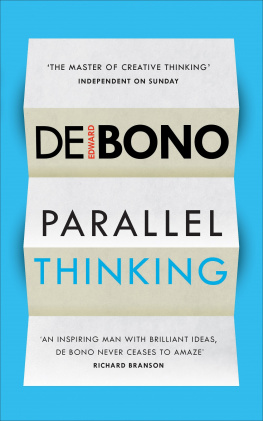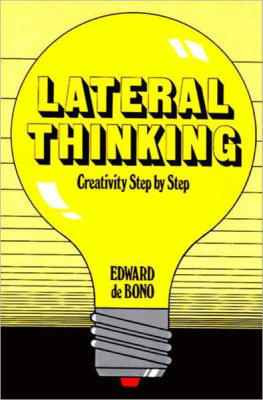Contents
Edward de Bono
I AM RIGHT, YOU ARE WRONG
FROM THIS TO THE NEW RENAISSANCE: FROM ROCK LOGIC TO WATER LOGIC
PENGUIN LIFE
UK | USA | Canada | Ireland | Australia
India | New Zealand | South Africa
Penguin Life is part of the Penguin Random House group of companies whose addresses can be found at global.penguinrandomhouse.com.
First published by Viking 1990
Published in Penguin Books 1991
Published in Penguin Life 2016
Copyright IP Development Corporation, 1992
The moral right of the author has been asserted
Cover Design: Dan Mogford
Edward de Bono hereby asserts his moral right to be known as the author of this work.
For more information about training in Dr de Bonos method, see www.debono.com
ISBN: 978-0-241-33689-2
PENGUIN LIFE
I AM RIGHT, YOU ARE WRONG
Edward de Bono invented the concept of lateral thinking. A world-renowned writer and philosopher, he is the leading authority in the field of creative thinking and the direct teaching of thinking as a skill. In the decades since Dr de Bono introduced lateral thinking, the concept has become so entrenched in our language that it is used equally in physics lectures, television comedies or brainstorming sessions. His key contribution has been his understanding of the brain as self-organising system. His work spans generations, continents and belief systems, and is equally influential in the boardrooms of leading businesses such as Apple and British Airways as on the shelves of classrooms in rural Africa.
Dr de Bono has written more than sixty books, in forty languages, with people now teaching his methods worldwide. He has chaired a special summit of Nobel Prize laureates, had faculty appointments at the universities of Oxford, London, Cambridge and Harvard, and been hailed as one of the 250 people who have contributed most to mankind.
Dr de Bonos classic bestsellers include Six Thinking Hats, Lateral Thinking, I Am Right You Are Wrong, How To Be More Interesting, Teach Yourself To Think, Teach Your Child How To Think, and Simplicity.
www.debono.com
THE BEGINNING
Let the conversation begin
Follow the Penguin Twitter.com@penguinUKbooks
Keep up-to-date with all our stories YouTube.com/penguinbooks
Pin Penguin Books to your Pinterest
Like Penguin Books on Facebook.com/penguinbooks
Listen to Penguin at SoundCloud.com/penguin-books
Find out more about the author and
discover more stories like this at Penguin.co.uk
Introduction: The New Renaissance
Humour is by far the most significant behaviour of the human mind.
You may find this surprising. If humour is so very significant, why has it been so neglected by traditional philosophers, psychologists and information scientists?
Why humour is so significant and why it has been so neglected by traditional thinkers together form the key to this book. Humour tells us more about how the brain works as mind, than does any other behaviour of the mind including reason. It indicates that our traditional thinking methods, and our thinking about these methods, have been based on the wrong model of information system. It tells us something about perception which we have traditionally neglected in favour of logic. It tells us directly about the possibility of changes in perception. It shows us that these changes can be followed by instant changes in emotion something that can never be achieved by logic.
There are probably no more than two dozen people in the whole world who would really understand (at the most fundamental, system level of brain mechanisms) why I claim such significance for humour. After reading this book there may be some more who come to understand the basis for the claim and its implications for the future of society.
*
There are those who hope to be able to hope that somehow the world will become a better place. There is a hunger for such hope. As we proceed along the countdown to the year 2000, is there much cause for such hope? There is no mystical significance about the year 2000, but it does provide a unique focal point, one that will not recur for another thousand years. It could become a turning-point if we tried to make it a turning-point. But how and why?
There are those who feel that the pressures of evolution, the emergence of new values and the application of collective good sense must ultimately make things better. Surely if everyone goes about their own business and exercises a sharp criticism of their governments and their fellow beings, all will be well.
There are those who see a real need for a sort of New Renaissance. They are tired of arguments, polemics, confrontations, conflicts and problems that cannot be solved. They see serious threats to the environment; third-world debt and poverty; the spread of drugs and new diseases; and house prices that no young couple can afford. They are tired of the excuse that all these things arise from the rate of progress and from the innate defects of human nature, which will always be short-sighted, selfish, greedy and aggressive.
Maybe we are doing our best and there is nothing more to be done. Maybe the world is actually far better off than it has ever been and that we are just made more aware of the problems by the effectiveness and energy of modern media.
There are also a few who sense that a New Renaissance may already have begun. The train is pulling out of the first station. There are only a few people on board. Most people will get on at much later stations, as the direction becomes clearer. There are those who see that the conscious attempts at new thinking brought about by Mikhail Gorbachev in the USSR (for whatever internal needs and reasons) signal a change in thinking from confrontational habits to more constructive habits. President Gorbachev is not the engine driver of the train but he is one of the first people to have boarded the train.
*
There is a time and a place and a courage for saying something. The New Renaissance needs a formal announcement in order that people may notice it and focus upon it with hope and resolve. That is the purpose of this book.
To announce a New Renaissance will always seem presumptuous and provocative, whoever makes the announcement and with whatever justification. Surely such things just happen without anyone making a formal announcement. Is the purpose of such an announcement to create a self-fulfilling prophecy in that if we believe in a New Renaissance we shall make it happen?
We do need to believe in the possibility of a New Renaissance because it is possible. There is always value in recognizing something that is already happening. Why delay recognition? There is, however, a much more substantial basis to the New Renaissance than hope and the year 2000.

